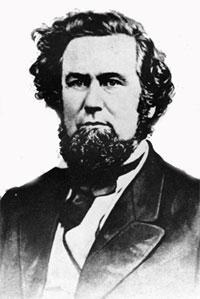Francis Harrison Pierpont (1814-1899)
Francis Harrison Pierpont (January 25, 1814 - March 24, 1899), called the Father of West Virginia, was an American lawyer, politician, and first and only governor of the Reorganized Government of Virginia (the free parts) during the Civil War. Often called "the Father of West Virginia," Pierpont's statue stands in Statuary Hall in the Capitol Building in Washington, one of two West Virginians so recognized.
 He was born near Morgantown, January 25, 1814, and died at Pittsburgh, March 24, 1899. He was a great-grandson of Col. Zackquill Morgan, founder of Morgantown. He received his middle name in honor of Gen. William Henry Harrison, under whom his father was serving at the time of his birth. Often called "the Father of West Virginia," Pierpont's statue stands in Statuary Hall in the Capitol Building in Washington, one of two West Virginians so recognized.
He was born near Morgantown, January 25, 1814, and died at Pittsburgh, March 24, 1899. He was a great-grandson of Col. Zackquill Morgan, founder of Morgantown. He received his middle name in honor of Gen. William Henry Harrison, under whom his father was serving at the time of his birth. Often called "the Father of West Virginia," Pierpont's statue stands in Statuary Hall in the Capitol Building in Washington, one of two West Virginians so recognized.
While Francis was an infant, his family moved to a farm in Marion County and later, when he was 13, to Fairmont, where his father built and operated a tannery. Educated in a log schoolhouse near his home, Pierpont entered Allegheny College, Meadville, Pennsylvania, in 1835. Following graduation, he taught school in Harrison County but also studied law and was admitted to the bar at Fairmont on May 2, 1842. Among the friends of his youth and young manhood were Waitman T. Willey, Gordon Battelle, and John S. Carlisle, all of whom played key roles in the West Virginia statehood movement.
In 1848, Pierpont began an association with the Baltimore & Ohio Railroad, serving as a right-of-way attorney in Marion and Taylor counties. He started a coal mine on family property in 1854 and entered into a partnership with coal pioneer James Otis Watson, whose family later controlled Consolidation Coal Company. On December 26, 1854, Pierpont married Julia Augusta Robertson of Wisconsin. Beginning in 1856, he helped to found Fairmont Male and Female Seminary, forerunner of Fairmont State College (now University).
An active supporter of Abraham Lincoln, Pierpont became more involved in politics with the outbreak of the Civil War.
In the opening days of the war, Pierpont spoke frequently and forcefully for the Union and against secession. He was a representative to the First and Second Wheeling Conventions in 1861, where he worked with other conservatives such as Willey to delay the immediate declaration of a new state, which he believed to be unconstitutional. On June 20, 1861, Pierpont was unanimously elected as governor of the unionist Reorganized State of Virginia, which sat at Wheeling until West Virginia entered the Union two years later.
Pierpont worked assiduously to obtain funds for the loyal government, raise troops for the state militia, defend northwestern Virginia from guerillas and keep as much of it as possible under federal control, and protect the B&O and Northwestern Virginia railroads. He worked hard for the recognition and admission of West Virginia.
A legislature was set up, a new constitution was drafted, and representatives were seated in the Federal Congress. The state adopted the name West Virginia and was admitted into the Union in 1863.
When Arthur I. Boreman was elected governor for West Virginia, Pierpont became governor of the "restored" state of Virginia, those counties occupied by Union troops. The capital was originally in Alexandria. In May 1865, at the direction of President Andrew Johnson, he proceeded to Richmond, where he headed the civil government as reconstructed under the Lincoln-Johnson Plan. As a result of the creation of military government in Virginia under the Military Reconstruction Act of 1867, Pierpont was removed from office on April 4, 1868, by Gen. John Schofield, the military governor.
After he was replaced by a military commander in 1868, Pierpont returned to his law practice in West Virginia. He served a term in the West Virginia House of Delegates in 1870 but lost his seat when the Democrats "redeemed" the government and took control of the young state. His partnership with Watson, a Democrat, was dissolved due to political tensions. He was collector of Internal Revenue under President James Garfield.
In his retirement he helped to found the West Virginia Historical Society and served as president of the General Conference of the Methodist Protestant Church.
Pierpont died at the home of his daughter in Pittsburgh on March 24, 1899, and was buried with military rites at Woodlawn Cemetery, Fairmont.
 He was born near Morgantown, January 25, 1814, and died at Pittsburgh, March 24, 1899. He was a great-grandson of Col. Zackquill Morgan, founder of Morgantown. He received his middle name in honor of Gen. William Henry Harrison, under whom his father was serving at the time of his birth. Often called "the Father of West Virginia," Pierpont's statue stands in Statuary Hall in the Capitol Building in Washington, one of two West Virginians so recognized.
He was born near Morgantown, January 25, 1814, and died at Pittsburgh, March 24, 1899. He was a great-grandson of Col. Zackquill Morgan, founder of Morgantown. He received his middle name in honor of Gen. William Henry Harrison, under whom his father was serving at the time of his birth. Often called "the Father of West Virginia," Pierpont's statue stands in Statuary Hall in the Capitol Building in Washington, one of two West Virginians so recognized.